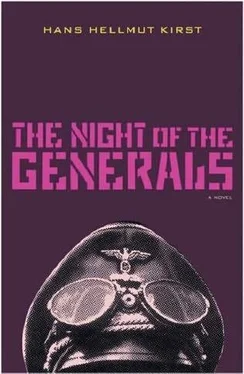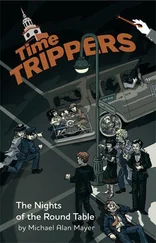Further conversations with Gottfried Engel, formerly assigned to Major Grau as a sergeant in counter-intelligence. Extracts from tape-recordings made eighteen years after the events described: “I can only repeat that I was in a subordinate position. I was not authorized to dictate policy and never did so. I was what they call an executive agent.
“As for the three generals you mention, I’d sum them up as follows: “1. General von Seydlitz-Gabler, Corps Commander. One of the old school, with all its virtues and vices. He’d really have been more at home in the last century. His wife was the power behind the throne, and there must have been times when he hated her guts. She pushed him too hard, and no man can stand that indefinitely.
“2. Lieutenant-General Tanz, Commander of the élite Nibelungen Division. A career-general of the first order with no inhibitions whatsoever. Rose from the ranks of the Freikorps and had just what it takes to go places. There were only two alternatives for him: a cross on his chest or another over his grave. He had an almost legendary reputation, and anyone who didn’t help to foster it became his personal enemy. Presumably that applied to Major Grau and me.
“3. Major-General Kahlenberge, Chief of Staff of the Corps Commander. Middle-class origins. Hard to sum up. Kept himself and his opinions very much to himself. No one ever really managed to get to the bottom of him. Tough to deal with and a shrewd negotiator. Extremely competent in almost everything he did and considerate towards his subordinates. Had a rather odd sense of humour at times. He was the real brains of the outfit. He certainly acted as von Seydlitz-Gabler’s throttle and brake, and for all I know he may have steered him as well.
“The rest is common knowledge. We were sent to Paris, and a murderer—who might or might not have been a general—was reprieved for the time being.
“Fate plays funny tricks, though. Almost two years later, in July 1944, we all met up again in Paris.”
PART TWO
The Case
Human lives for sale
PARIS, 1944
Lucienne sang, beseeching her audience to speak to her of love. She had closed her eyes as if dreaming, but it might have been because she was dazzled by the harsh glare of the spotlight. It might also have been because she preferred to shut out her surroundings, for many of the men who were watching her wore uniform, and it was not the uniform of her own country or its allies.
“Isn’t she terrific!” whispered Captain Kraussnick.
He bent forward confidentially as he spoke, not unlike a black marketeer commending the quality of some merchandise to a prospective customer. Kraussnick regarded Lucienne as his personal discovery, and a special table was permanently reserved for him next to the stage.
“Are you getting a percentage out of this?” asked General Kahlenberge.
General von Seydlitz-Gabler, who sat beside him, murmured: “The creature’s got a voice like silk!"—which reminded him that his wife had recently expressed a desire to buy some dress lengths.
Lucienne went on singing. She was not a performer like the great Sasha. Lucienne had to live and her establishment needed the business. The great Sasha liked to scintillate, to demonstrate his regal superiority. He regarded himself as an essential component of French history, but Lucienne was a Parisienne, no more and no less. It was almost a matter of indifference to her who listened to her as long as she was loved as an institution devoted to thechanson.
People who heard Lucienne seemed to be bathed in the glow of her reputation. She sang in a pool of rosy light, and the fleshy faces bordering it radiated pleasure and satisfaction. The sameness of their uniform was not so far removed from the uniformity of dinner jacket or tails. Even generals could let themselves be seen in uniform here because a visit to Lucienne counted as a sort of cultural outing.
There was a scattering of night-club femininity—identical ivory faces partitioned by the black and scarlet streaks of eyebrow and lip, the former thin and the latter thick, but both applied with panache. Here and there was a naked-seeming expanse surmounted by a pair of blue eyes—female members of the occupying forces clad in blue or field grey. Women in uniform, but women for all that.
The song which begged the listener to speak of love—and nothing else—had several verses. Lucienne sang them all in the same abstracted way, as if immersed in a sea of emotion and melody. Her audience hardly dared breathe.
The last notes died away and the lights went up to a burst of applause. There was a universal raising of glasses to lips—at least six bottles’ worth inside five seconds, the manager calculated swiftly. Lucienne’s nightly appearance was the establishment’s most lucrative asset.
“Well, did I exaggerate?” asked Captain Kraussnick.
“I found her most stimulating,” conceded General von Seydlitz-Gabler. The General had been highly decorated since Warsaw but was still in command of a Corps. Kahlenberge, his indispensable assistant, was still Chief of Staff but had been invested with the Knight’s Cross and was now a lieutenant-general.
“Has the General any special request to make?” Kraussnick inquired.
“Not at the moment,” said von Seydlitz-Gabler.
“But you can sound out the ground, my dear chap,” added Kahlenberge with an eye to the future.
The entertainments specialist rose promptly to his feet, not forgetting, before he went off to make inquiries, to see that a new bottle of Veuve Clicquot Rosé 1933—the third, and what a year!—was placed within reach, chilled to a temperature of between twelve and fourteen degrees. Although Kraussnick was a connoisseur it was not an easy job to maintain his reputation, let alone enhance it. In his experience generals preferred young flesh, but that was just where the market was shortest.
“One can forget one’s troubles in a place like this,” General von Seydlitz-Gabler said pensively. “We ought to make the most of it.”
Kahlenberge drained his glass with relish. He found himself doing everything with relish these days. It was as though he were being challenged to choose between life and death. As long as no one forced him to die he chose life, but anything might happen, especially in a world in which soldiers were compelled to behave like bandits.
Kahlenberge smiled opaquely and leant forward. “One way or another, we’re going to have to make up our minds what sort of country we want. All the signs are there if you know where to look for them.”
The G.O.C. stared at the ceiling, screwing up his eyes at the brightness of the overhead lighting. He saw a vista of snowy white and glistening gold interspersed with a red as rich and warm as life-blood. The cross-beam above his head was adorned with squattingputti, firm-fleshed and compact as Würzburg baroque, except that theseputti were pink as marzipan and rouged like miniature whores.
“I refuse to resort to underhand measures,” he said. “Candour has always been my watchword.”
Kahlenberge nodded cheerfully. “Which is precisely why you ought to find it easy to define your position when people ask you what sort of Germany you want.”
“I’m a man of moderation,” said the General, with all the caution of an experienced angler. “I refuse to accept things unthinkingly just because someone tries to ram them down my throat. What’s more, I’ve always been conscious of my duty to Germany, which is one reason why I’m a general.”
“And that,” said Kahlenberge gently, “is why you must automatically be against everything which claims to represent Germany today.”
Von Seydlitz-Gabler blinked at the lights again. “I have tried to serve my country faithfully for as long as I can remember.”
Читать дальше












